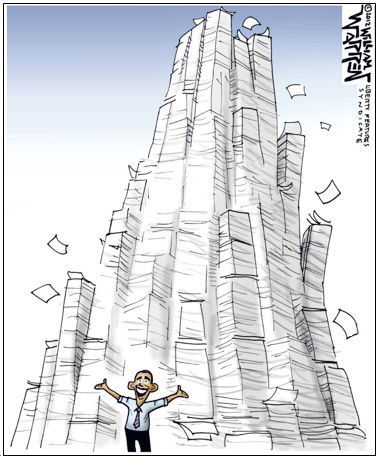By Natalia Castro
Congress began dismantling Obama’s regulatory state as soon as it came into session; utilizing the power of the Congressional Review Act of 1996 (CRA) for the first time in nearly two decades, Republicans in the House have begun taking back their own authority and opened up the gates to a stronger, healthier economy.
The CRA provides Congress with the ability to overturn a federal agency regulation provided a joint resolution of disapproval is passed within the first 60 legislative days after a regulation is finalized. Then, the overreaching regulations are effectively erased from the law, and would require a vote of Congress to re-enact them.
With no possibility for filibuster with CRA action in the Senate, Republicans only require a simple majority to terminate the midnight regulations President Obama imposed onto the nation. As the Senate continues to struggle through confirmation hearings and votes for President Trump, the House has refused to stall the process of removing harmful regulations and continues pushing them through votes.
In just over a month, the House has successfully passed thirteen CRAs that target the some of the most obvious and recent overreaches of the Obama administration.
The House has passed joint resolutions to disapprove of regulations that cripple business on the state and local level. With successful passage of H.R. Res. 37, disapproving of the Federal Acquisition regulation and H.R. Res. 36, disapproving of waste prevention, production subject to royalties, and resource conservation regulations, the House will remove regulatory burdens from 61 percent of small business entities. The latter regulation has an estimated cost ranging from $114-$279 million per year; the Federal Register predicts for businesses with under 500 employees there would be a cost increase of $55,200 per year.
Small businesses are being freed of the burdens of the Obama administration; each regulation removal the House imposes provides capital for businesses to expand.
Even within the classroom, the passage of H.J. Res. 57 cuts at the heart of the Secondary Education Act of 1965 by removing requirements Obama’s national education plan put on state governments’ accountability systems for students. This measure has already reached successful passage in the Senate as well, moving swiftly to the president.
These are just some of the regulations the House has successfully passed to re-empower American small businesses and local communities. While seven CRA’s still await a Senate vote, several have already moved on to full passage to ensure economic security and personal liberty for the country.
H.J. Res. 40 removes additional background checks on Social Security recipients for gun ownership. NPR of Feb. 2017 estimated this regulation would prevent about 75,000 people found mentally incapable of managing their own finances from purchasing a gun. By retracting this regulation, the House has begun the process of removing restrictions to the Second Amendment the Obama administration imposed without due process — a violation of the Fifth Amendment.
The House, Senate, and President Trump have also successfully implemented CRA rescissions to eliminate the Department of Interior so-called Stream Protection Rule and the Disclosure of Payments by Resource Extraction Issuers regulation.
The Stream Protection Rule alone produces an estimated cost to the coal industry of $81 million according to the Federal Registrar.
The House has spent its first months diligently pursuing the promise of returning American industry to productivity. Now the Senate must follow suit, and limit debate if necessary to at a minimum get every CRA rescission the House passed onto President Trump’s desk for signature.
The House has not been silent since Trump came into office, but rather has been actively working to save the economic disaster Obama left our country on the brink of. The House has worked diligently to pass legislation that benefits state and local economies and removes overreach in every American classroom and home. The price Obama regulations put on the economy will come to be due soon, and the House is working to ensure our government has the revenue and GDP growth to prevent a crisis, by ensuring the American people are being restricted from success.
Natalia Castro is a contributing editor at Americans for Limited Government.







